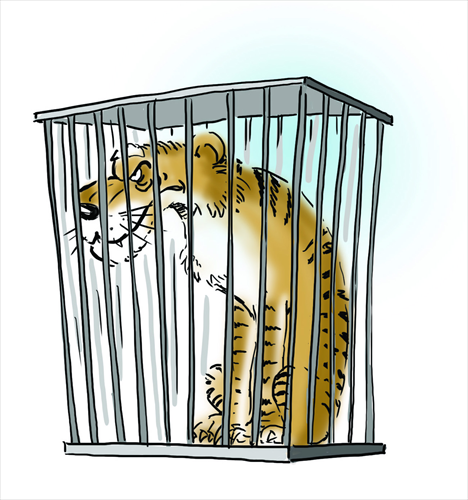HOME >> OP-ED
‘Iron fist’ at top needed to ensure proper democracy
Source:Global Times Published: 2014-1-9 0:23:01

Illustration: Liu Rui/GT
The political ideas associated with neo-authoritarianism developed in the 1980s when China gradually enjoyed the fruits of reform and opening-up under then leader Deng Xiaoping.Compared to totalitarianism, which is characterized by absolute obedience to the authorities, neo-authoritarianism refers to strongman or authoritarian politics that aims to shepherd a country into economic modernity.
These countries began their development path only since the beginning of the last century, much later than the Western developed ones, and most of them have failed in establishing parliamentary democracy.
Market-oriented modernity will serve as the economic and social foundation for countries to realize democracy. It is unrealistic for the latecomer countries to realize democracy because diverse interest groups have not been formed and a market-driven rule of law has not been established.
China has always been in need of a very powerful leader who has both prestige and power to push the country forward.
Theoretically, the policies and ideas promoted by Deng marked the arrival of neo-authoritarianism in China.
The essence of Deng's ideas is that the authority of the CPC should not be challenged and the reform and opening-up must be persisted to boost productivity no matter the forms of ownership. In other words, the market decides.
From the late 1980s to the early 1990s, Deng defeated two forces that challenged his reforms. One was the radical pro-West liberals and the other the conservatives who opposed to the reform and opening-up. In 1992, he paid a visit to southern China, through which he reaffirmed his political dominance and unleashed a rapid expansion of the market.
Generally speaking, an iron reformist like Deng is representative of neo-authoritarianism.
If we say the Deng Xiaoping era was the 1.0 version of China's neo-authoritarianism, then the current Xi Jinping era is the 2.0 version of neo-authoritarianism.
During Deng's government-dominated reforms, the other side of the coin was that interest groups closely linked to the government have gradually monopolized social resources, which resulted in unfair distribution and slumping social competitiveness.
To stop this trend from deepening, a new round of neo-authoritarianism is needed to change the semi-bureaucratic and semi-market economy into a mature and complete market economy. This is what the current leadership under Xi should do and is doing.
During this process, an "iron fist" is also needed. Xi should strengthen his ideological dominance and discourse power by curbing an explosion of political participation, because too much political participation is no good for political stability.
As long as the system and society remain stable, he can use his "iron fist" to push forward larger-scale reforms to curb social problems such as corruption and unfairness.
Ideally, after decades of neo-authoritarianism reforms, most social problems will be eliminated, extreme thoughts such as pro-left and pro-right will be marginalized, and the Chinese people will reach a consensus that the country led by the Party will eventually achieve prosperity and democracy. At that time, we can talk about democracy in a real sense.
Unlike democracy in many developing countries where social disturbances constantly occur, China's democracy will be achieved peacefully and competition among diverse interest groups will be carried out under rule of law.
But we should also be on alert that every system has its defects. As neo-authoritarianism functions, we cannot exclude the possibility that wrong decisions could be made.
As time goes by, as long as China keeps trying, the problems can be avoided through reforms.
The article was compiled by Global Times reporter Wang Wenwen based on an interview with Xiao Gongqin, a professor of history at the Shanghai Normal University. wangwenwen@globaltimes.com.cn
Posted in: Viewpoint